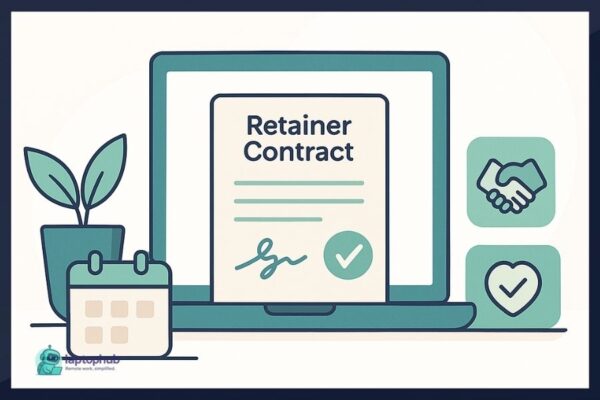Most freelancers don’t quit because they lack skill, they quit because they hit a ceiling. Clients keep coming in, but the hours keep stacking up, and there’s no breathing room to think, let alone grow. Scaling a freelance business isn’t about adding chaos. It’s about creating structure, building leverage, and designing a business that earns more without consuming your entire life.
💡Key takeaways:
- Treat your freelance work like a business by setting goals, tracking performance, and focusing on long-term value.
- Specialize, productize, and price your services in ways that attract ideal clients and increase profitability.
- Build scalable systems, automate repeatable tasks, and delegate non-essential work to free up your time.
- Invest in relationships, recurring revenue, and sustainable habits to create consistent growth without burnout.
Shift your mindset from worker to business owner
Most freelancers stay stuck because they only think in terms of hours worked. If you want to scale, you need to act like a business owner. That means:
- Planning beyond the next invoice
- Setting financial and operational goals
- Learning to say no to work that doesn’t serve your long-term direction
Think in terms of ROI. Ask yourself: what’s the most profitable use of my time this week? This month? The answer shouldn’t always be client work.
Get specific with your niche and offer
Generalists are easy to overlook. Specialists are easy to refer.
When you narrow your focus, you become more visible to the right clients. You can charge more, streamline delivery, and market yourself with clarity.
Instead of saying, “I do graphic design,” say, “I design brand identities for early-stage wellness startups.” That’s memorable and searchable.
To define your niche:
- Audit your best and most enjoyable projects
- Identify patterns: industries, project types, outcomes
- Research where demand and your strengths overlap
Package your services for clarity and value
Selling custom work every time is exhausting. Clients prefer clarity. You can still offer custom services, but present them as packages.
Example:
- “SEO Blog Content Package: 4 optimized posts/month, keyword research included, $2,000/month”
This helps clients see the value and makes it easier for you to sell and deliver. Clear packages also open the door to hiring help, since delivery becomes repeatable.
Raise your rates with intention
If you’re fully booked and still stressed, your pricing is too low.
Calculate your real hourly rate, factoring in non-billable time. Then raise your rates based on value—not just time.
- Compare yourself to others in your niche and experience range
- Collect and showcase ROI-driven testimonials or case studies
- Shift the conversation from “hours” to “outcomes”
Clients will pay more for a freelancer who positions their work as solving a business problem.
Build systems to save time and avoid bottlenecks
You can’t scale with chaos. Every repeated task in your freelance business can be streamlined:
- Client onboarding: Use templates for proposals, contracts, and welcome kits
- Scheduling: Automate with tools like Calendly
- Invoicing: Use accounting software that tracks payments and expenses
- Communication: Set boundaries and use project management tools to reduce email overload
Systematizing doesn’t mean making things robotic. It frees up your brain to focus on creative or strategic work.
Create recurring revenue streams
Feast-or-famine is one of freelancing’s biggest stressors. Retainers and subscriptions provide stability.
Ideas:
- Monthly content packages
- Website maintenance plans
- Coaching or consulting retainers
Recurring revenue smooths out your income and makes financial planning easier. It also builds long-term client relationships often with less selling.
Productize what you do best
Productized services are streamlined, packaged offers with set pricing, scope, and timeline. They allow you to scale without reinventing the wheel each time.
Examples:
- “Brand Audit Report: $750, delivered in 7 days”
- “UX Website Review + Loom Walkthrough: $499”
Eventually, you can also add passive income through digital products like templates, guides, or courses. Start with a problem your current clients face, then build a solution once and sell it many times.
Outsource and build a support network
Delegating is uncomfortable at first. But if you’re at capacity, your growth depends on it.
Start small:
- Hire a virtual assistant for admin and scheduling
- Bring in subcontractors for overflow client work
- Work with a bookkeeper to clean up your finances
Document your processes before you delegate. That way, you’re not just hiring people, you’re building systems that anyone can follow.
Invest in marketing beyond referrals
Referrals are great but unpredictable. Scalable businesses have consistent lead generation systems.
Options to explore:
- SEO content (blog posts, case studies)
- Email marketing to nurture leads over time
- LinkedIn or Twitter to build visibility and thought leadership
- Paid ads if you have high-ticket offers and a solid funnel
Don’t try everything at once. Pick one channel and commit. Consistency is more important than volume.
Strengthen your client relationships
Client retention is cheaper and easier than constant acquisition. Happy clients refer others, sign bigger contracts, and stay longer.
Ways to improve retention:
- Proactively recommend new ideas
- Deliver work slightly ahead of deadlines
- Send reports or recaps that show the impact of your work
- Ask for feedback and act on it
The goal is to become a trusted partner, not just a hired hand.
Track performance and adjust accordingly
You can’t grow what you don’t measure. Make time monthly to review your business performance.
Track:
- Income by client and project type
- Time spent vs. revenue earned
- Website traffic and leads
- Conversion rates from inquiry to booking
Look for patterns. Which services are most profitable? Which clients are easiest to work with? Use the data to guide your decisions.
Say no strategically to protect your time
Every yes is a trade-off. As your business grows, you’ll get more inbound opportunities. Not all of them will be good.
Protect your time by turning down:
- Projects outside your niche
- Clients who can’t respect your process or boundaries
- Low-paying gigs that drain your energy
Say no to keep space open for better work. Your best clients won’t haggle—they’ll value your clarity.
Prioritize your health and sustainability
Working nonstop is not a growth strategy. Scaling a freelance business doesn’t mean running yourself into the ground.
Make room for:
- Time off: block it into your calendar proactively
- Physical health: movement, rest, food that fuels you
- Mental space: journaling, therapy, hobbies, real weekends
If you burn out, your business suffers. If you’re healthy and focused, you can grow sustainably.
Scaling freelance business FAQs
It means growing your income and impact without increasing your hours, by using systems, pricing strategies, and smart delegation.
Not necessarily. You can start by outsourcing low-value tasks or collaborating with other freelancers to increase your capacity.
It’s possible, but niching down helps you attract better clients, charge more, and simplify your marketing.
Offer monthly retainers, subscription-based services, or productized packages that deliver ongoing value.
Trying to scale chaos—without first building systems, setting boundaries, and defining clear offers.
Final thoughts
You don’t need a huge team, a fancy office, or 18-hour days to grow your freelance business. You need clarity, systems, and the guts to stop doing everything yourself. Scaling a freelance business is about stepping into your role as a business owner and making decisions that serve both your income and your life. The work won’t scale until you do.





